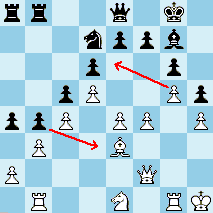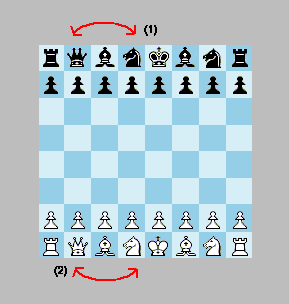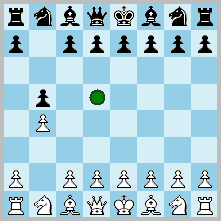 Zuzammenfassung
Zuzammenfassung
(Chess4, D-chess, Queen swap chess)
 Zuzammenfassung
Zuzammenfassung
Introduction
If positioned on a knight or a rook file a pawn can jump like a knight to an empty square, east-north-east or west-north-west. A condition is that the pawn is blocked by an enemy pawn. Compared with standard chess, this means that a flank pawn is sometimes endowed with an extra jump move, which increases its value only slightly. Hence the flanks cannot easily be blocked, something which greatly enhances attacking play.
There are three different variants of dynamic pawns. The pawn is endowed with the extra jump move to an empty square (1) if blocked anywhere on the file (2) if blocked on the 4th rank onwards (3) if blocked on the enemy side. Note that the opponent can prevent this jump move by occupying the destination square, so it is not always easy to achieve.

Blocked flank pawns (knight and rook pawns) have an additional jump move to empty square.
In Dynamic Chess (Chess4) black can decide the initial positions of the queens. (If black so chooses, the piece array remains unchanged.) The positions must mirror each other. Dynamic Chess is like standard chess except that the players can, before play begins, swap places of the queen and a light piece. When the queen is swapped, the relocatee ends up on the queen’s square. One restriction is that the bishops mustn’t end up on the same square colour. Note that black begins by swapping his queen. Alternatively he can choose to leave the position as it is. The white player then mirrors black’s swap. After the queens thus have been swapped the turn is still with white. Now white starts the game by making the first move.

Dynamic chess may optionally be played with queen relocation and with standard pawns (“Queen swap chess”).
Discussion
 The flank pawn, if blocked, can make the oblique jump move to an empty square. In an alternative variant the pawn can only make this jump move if blocked on the enemy side. In this position, Black can make the corresponding jump to d4.
The flank pawn, if blocked, can make the oblique jump move to an empty square. In an alternative variant the pawn can only make this jump move if blocked on the enemy side. In this position, Black can make the corresponding jump to d4.
Dynamic Chess is specially designed for rapid chess, since it makes the game more aggressive and less monotonous. Aggressive play on the flanks is facilitated as pawns cannot easily be blocked, something which greatly enhances attacking play. In the general case, it is easy to control these extra destination squares, or to occupy them, thus preventing the pawn from going there. In many cases it is simply bad to go there. However, it opens up many new attacking possibilities. This pawn move isn’t illogical. It moves forward one rank, which is natural to the pawn. Keep in mind that the pawn is already different from all other pieces in that it can only advance to an empty square, different from the capture square. In this variant, yet another pawn advance to empty square is added, provided that the pawn is positioned at the flank and is blocked by a pawn. It is a natural move that already belongs in chess in the form of the knight jump. See also Valiant Chess.
Internet chess is a different experience than table chess. I conjecture that it will with time influence both its development and the rules of chess. Table chess is typically slow. It is a much more psychological and instinctual experience. You can see the terror in the opponent’s face when you sacrifice the bishop with check. Chess is by nature very strategical and, in the opening phase, very theoretical, spiced with tactical themes. It demands deep analysis, a sincere effort, both during the game and before, not to become boorish wood-chopping.
Since correspondence chess is dying on account of the computers, Internet chess is essentially rapid chess, yet without the psychological atmosphere of table chess. What’s more, the very valuable ingredient, which is the hard toil to produce a memorable game, is lacking, too. This means that the experience of chess is devaluated and the game is experienced as somewhat monotonous. Sooner or later it grows slightly dull. It is as if chess isn’t really designed for Internet play, while it isn’t a superficial game. You must dig deep into it to really appreciate the game. You need good play from both parties, and a true effort, in order for it to be really engaging.
I have also played Chinese Chess (Xiangqi) on Internet servers. Xiangqi is really cut out for the Internet. It is, by nature, a fast and very intuitive game. It is all about tactics, while strategical planning plays no part at all. Compared with chess, it is superficial. Yet it is entertaining as tactical intricacies start immediately and it goes on until either party is mated. You never get a breather, because it is all about grabbing the initiative and to attack, before your opponent does the same. It is fast-paced, since you never have to find out how to solve difficult problems by devising a deep plan. Instead, you solve problems by devising short tactical lines involving some finesse. Sometimes the tactical situation is so impermeable that you cannot possibly calculate it, even if you have loads of time. At these occasions one must resort to intuition, which draws on experience.
Xiangqi opening theory is much different from chess theory. In Xiangqi, it’s like all the variations are thrown into the same bucket. It’s more or less the same themes, which means that you cannot benefit much from studying theory. There aren’t really different lines that differ radically in opening strategy. Some are more aggressive and some are slower, that’s all. In chess, if a player decides to change opening from, say, the Stonewall to the Benoni, it’s like learning a different game. If he has played hundreds of Internet games in the Stonewall, he is becoming slightly bored, and that’s why he has decided to change opening. The ”Stonewall universe” of variations is quite interesting, provided that players make an effort of strategical planning. But this seldom happens in Internet play. So he decides to change to the Benoni and finds that he has regressed to amateur level. This is yet another nail in the coffin for his chess passion.
This never happens in Xiangqi. In opening play anything goes. Provided that the move isn’t immediately refutable, it is wholly playable. As Xiangqi isn’t partitioned into different ”opening universes”, like the Benoni and the Stonewall, the whole field of tactical themes are always present, which is always the same as all other openings. There is no such thing as a boring or a drawish opening in Xiangqi. As opening theory isn’t essential, cheating is not a big issue. Xiangqi softwares are weaker than human players. They seem to pose no threat at all to Grandmasters. I don’t know why it is so. I don’t think the game is more complex. It could have to do with the ramification of variations, i.e. how the search tree looks, as it is not partitioned into smaller ”opening universes”. More importantly, there is always a tactical trap beyond the search horizon, since tactical traps are always present.
So there are no constraints and no monotony, which often occurs in Internet chess, especially when you have played the French Exchange for the umpteenth time. Playing the English Opening with the monotonous b2-b4-b5, etc., is interesting in slow games, because you are able to appreciate the fine nuances, pertaining to endgame qualities, etc. In rapid chess those nuances play no essential part. Chess is a very fine-tuned and deep game that deserves a better treatment. We can solve this problem by introducing a more dramatic variant of chess, designed for rapid chess. A feature of Internet chess is that some games are boring while some are engaging, it’s up and down all the time. Games are engaging when they are well-played, especially when they are theoretically correct, and no player blunders. However, many games degenerate into dreary wood-chopping that is essentially meaningless as there is a lack of intellectual content, only the monotony of realizing a material advantage.
In Xiangqi, however, the loss of a pawn doesn’t mean anything. Even if a player blunders a whole piece the game often continues, as there is no monotonous way of realizing a material advantage, but the player must resolve the problems by tactical measures. Sometimes you can blunder a whole rook. The tactical complexity is such that the opponent can miss out on one of the many tactical traps, and then you’re back in the game. The conclusion is that the game is fun even if there has earlier been very bad play. The search after tactical finesses continues. There is no such thing as a boring game of Xiangqi. Monotony doesn’t exist. However, the game can be accused of being superficial. Chess is much deeper.
I fear that Xiangqi will continue to expand on the Internet at the expense of chess, if Internet chess cannot transform and adapt. We must begin to differ between Internet chess and table chess. These two arenas endow chess with very different qualities. A suitable variant for Internet rapid chess should be developed; a variant, perhaps, that has some of the characteristics of Xiangqi. For instance, a Xiangqi pawn cannot be blocked. It might be enough to change the rule for the pawn, so that it cannot be blocked so easily, what contributes to the slow and strategical character of chess, so unsuitable for Internet rapid chess. Such a variant will not make Fide-chess obsolete. As a belligerent complement to drawish and strategical Fide-chess it will contribute to the popularity of chess.
☛ You can download my free Dynamic Chess program here (updated 2020-12-08), but you must own the software Zillions of Games to be able to run it (I recommend the download version).
☛ You can play Dynamic Chess online and by e-mail here.
☛ See also related variants in my article about Relocation variants.
☛ Don’t miss my other chess variants.
Zusammenfassung
Neue Idee! Der blockierte Flankebauer (a, b, g, h) bekommt einen extra Springer zug nach leeren Feld. Der Bauer muss von einem feindlichen Bauer blockiert werden. Es löst das Blockade Problem! Es ist perfekt für Internet Schnellschach, weil es macht das Spiel mehr aktiv. Um ein gutes Spiel zu sein, Schach muss langsam gespielt werden, sonst ist es Holzhacken. Mit dieser Regel wird es weniger strategisch, noch taktischer. Dies macht Schnellschach intellektuell anregend. Die Blockade der Flankebauern ist ein sehr feines Thema, aber nicht im Schnellschach. Mein Vorschlag behält den blockierten Bauernkette, sonst wäre es nicht mehr Schach genannt werden. Nur in ganz besonderen Fällen kann die Bauernkette, auf den Flanken, gebrochen werden. Wir verändern die Regel ein bisschen, und Schnellschach ist wieder intellektuell anregend. Also, unterschiedliche Regeln mit unterschiedlichen Bedenkzeit! Dieses Bauernsprung ist gut. Der Gegner kann es verhindern, weil Er kann das Feld Bezetsen. So es ist nicht immer einfach zu erreichen. Die Spieler haben immer noch die Kontrolle. In einer alternativen Variante, ist der zusätzliche Schritt nur erlaubt, wenn der Bauer die andere Seite erreicht hat.
© Mats Winther, 2012 April